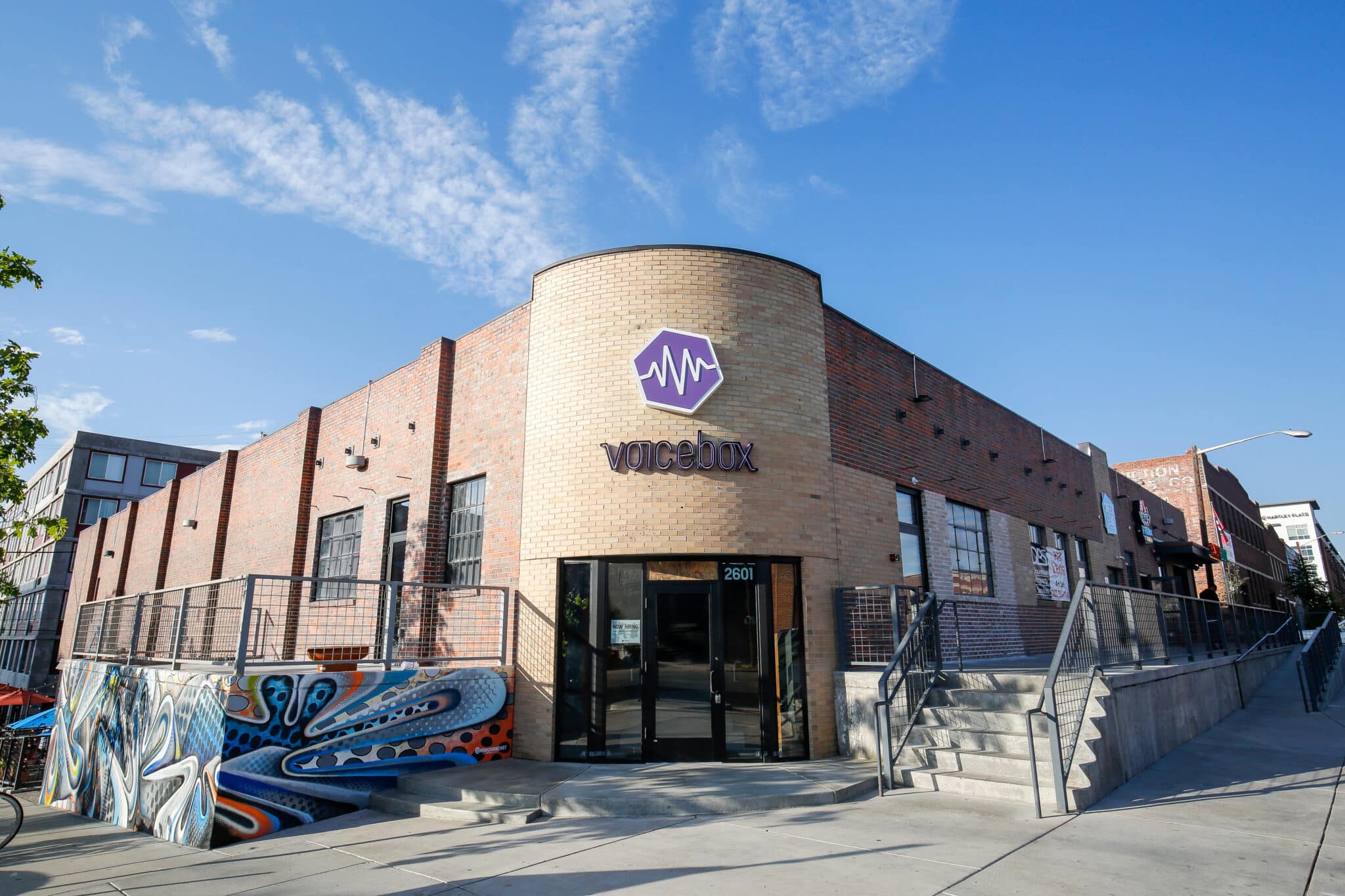
Voicebox Karaoke opened its first location outside of Portland in Denver in 2016. (Photo courtesy of Voicebox Karaoke)
The failure of a karaoke bar in RiNo this year was caused not by market forces or the pandemic, its former investors say, but by an owner who wrongfully diverted $1.2 million from it.
Voicebox Karaoke opened in a 4,500-square-foot space at 2601 Walnut St. in 2016 and moved out this summer. Voicebox CEO Scott Simon told BusinessDen in March that it was forced out by a landlord who refused to be lenient when the pandemic tanked revenues.
But investors in Voicebox RiNo are now telling a different story.
In a lawsuit filed Nov. 22 in Denver District Court, local developer Ken Wolf, his firm Wolf Investments and two other investors say they put $450,000 into Voicebox RiNo in 2016. They also personally guaranteed a still-outstanding $300,000 bank loan, they say.
According to the investors, their arrangement with Simon required Voicebox to pay them 100 percent of the profits from Voicebox RiNo until their $450,000 had been recouped and 40 percent of profits after that. The remainder would go to Voicebox.
Voicebox was founded in Portland, Ore., and its two remaining karaoke bars are still there. Until this year, it had five locations in four cities: Portland, Denver, Boise and Fort Worth, Texas.
In late 2019, Voicebox opened the Idaho and Texas locations but they never turned a profit, according to the lawsuit. So, in 2021 and early 2022, Simon moved $1.25 million from the profitable RiNo location to the other locations in an attempt to keep them afloat, the lawsuit claims.
The investors in Voicebox RiNo say Simon did not have authority to move that money around and withhold profits from them. They say they didn’t learn that he had until August.
“As a result of the diversion, Voicebox RiNo no longer generates any revenues and Wolf Investments and (other investors) have not, and will not, receive the preferred returns to which they are entitled to repay their capital investment,” their lawsuit states.
Reached by email Monday, Simon declined to comment on the lawsuit.
The lawsuit does not list how much money investors believe they are owed, only that they should’ve received “a significant portion of the $1,247,415” that was diverted. VoiceBox RiNo will soon default on the $300,000 bank loan the investors guaranteed, they say.
The investors are suing eight defendants. In addition to Simon they include Voicebox’s holding company; Lagniappe Capital Partners, a Denver firm that invested in Voicebox and is accused of helping it divert the $1.25 million; and several Lagniappe executives.
Lagniappe, which does not have a publicly listed phone number, did not respond to emails requesting comment. Its website states that it invests “in operating companies across the entertainment and leisure universe” and lists Voicebox among them.
2601 Walnut is now occupied by outdoor brand Arc’teryx. The building is owned by Edens, a landlord that has also been on the receiving end of Wolf lawsuits.
Last year, Wolf filed three lawsuits against Edens regarding lease terms at properties in RiNo. Wolf owned the properties, then sold them to Edens in 2018 but remained a tenant there. The lawsuits were settled out of court.
Wolf declined to comment on the Voicebox lawsuit Monday, saying it speaks for itself.
The investors are represented by Denver attorney Chris Baumgartner with the Agilis Legal law firm.

Voicebox Karaoke opened its first location outside of Portland in Denver in 2016. (Photo courtesy of Voicebox Karaoke)
The failure of a karaoke bar in RiNo this year was caused not by market forces or the pandemic, its former investors say, but by an owner who wrongfully diverted $1.2 million from it.
Voicebox Karaoke opened in a 4,500-square-foot space at 2601 Walnut St. in 2016 and moved out this summer. Voicebox CEO Scott Simon told BusinessDen in March that it was forced out by a landlord who refused to be lenient when the pandemic tanked revenues.
But investors in Voicebox RiNo are now telling a different story.
In a lawsuit filed Nov. 22 in Denver District Court, local developer Ken Wolf, his firm Wolf Investments and two other investors say they put $450,000 into Voicebox RiNo in 2016. They also personally guaranteed a still-outstanding $300,000 bank loan, they say.
According to the investors, their arrangement with Simon required Voicebox to pay them 100 percent of the profits from Voicebox RiNo until their $450,000 had been recouped and 40 percent of profits after that. The remainder would go to Voicebox.
Voicebox was founded in Portland, Ore., and its two remaining karaoke bars are still there. Until this year, it had five locations in four cities: Portland, Denver, Boise and Fort Worth, Texas.
In late 2019, Voicebox opened the Idaho and Texas locations but they never turned a profit, according to the lawsuit. So, in 2021 and early 2022, Simon moved $1.25 million from the profitable RiNo location to the other locations in an attempt to keep them afloat, the lawsuit claims.
The investors in Voicebox RiNo say Simon did not have authority to move that money around and withhold profits from them. They say they didn’t learn that he had until August.
“As a result of the diversion, Voicebox RiNo no longer generates any revenues and Wolf Investments and (other investors) have not, and will not, receive the preferred returns to which they are entitled to repay their capital investment,” their lawsuit states.
Reached by email Monday, Simon declined to comment on the lawsuit.
The lawsuit does not list how much money investors believe they are owed, only that they should’ve received “a significant portion of the $1,247,415” that was diverted. VoiceBox RiNo will soon default on the $300,000 bank loan the investors guaranteed, they say.
The investors are suing eight defendants. In addition to Simon they include Voicebox’s holding company; Lagniappe Capital Partners, a Denver firm that invested in Voicebox and is accused of helping it divert the $1.25 million; and several Lagniappe executives.
Lagniappe, which does not have a publicly listed phone number, did not respond to emails requesting comment. Its website states that it invests “in operating companies across the entertainment and leisure universe” and lists Voicebox among them.
2601 Walnut is now occupied by outdoor brand Arc’teryx. The building is owned by Edens, a landlord that has also been on the receiving end of Wolf lawsuits.
Last year, Wolf filed three lawsuits against Edens regarding lease terms at properties in RiNo. Wolf owned the properties, then sold them to Edens in 2018 but remained a tenant there. The lawsuits were settled out of court.
Wolf declined to comment on the Voicebox lawsuit Monday, saying it speaks for itself.
The investors are represented by Denver attorney Chris Baumgartner with the Agilis Legal law firm.

